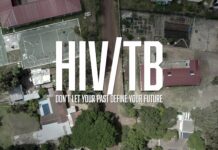Khetha is a new online platform aiming to teach young people about HIV testing. The app was launched at the 2019 South African Aids Conference. The platform is a joint project between Doctors Without Borders – MSF Southern Africa (MSF) and Aviro Health. The Daily Vox team takes a closer look at the new platform.
#SAAIDS2019
#SAAIDS2019 is a three-day conference in Durban. The conference which took place between June 11-14 is in its ninth year. It brings together government, policy makers, civil society, and media to discuss and come up with solutions and plans to tackle HIV/AIDS in South Africa. The theme of this year’s conference was “Unprecedented Innovations and Technologies.”
The biennial conference is the second largest HIV conference in the world. It is attended by over 3,000 people – 25% of which are from countries other than South Africa.
“The 9th AIDS conference will focus on the unprecedented scientific, social and digital innovations/technologies which could expand possibilities and opportunities towards controlling the HIV & AIDS epidemic.” said the conference chair, Prof Refilwe Nancy Phaswana-Mafua, deputy vice-chancellor: research and innovation at North-West University.
MSF launched the new “HIV counselling syllabus for youth” in partnership with Aviro Health at the conference. Aviro Health is a South African-based design-focused health company “looking to improve the experience of healthcare.” Khetha – the online platform wants to reach young people through their phones and computers. It focuses on teaching young people about HIV testing and how to access health services if they test positive.
MSF Southern African and Aviro Health partnership
MSF and Aviro Health have come together to develop the syllabus which seeks to engage with adolescents and young people. Khetha is an Zulu/Xhosa word which means ‘to choose’. The platform is made up of open-source video content making it easy to use by all. In particular the app can be used by NGOs, clinics and health facilities to support HIV counselling and information sessions for young patients.
Damian Hacking, MSF’s health coordinator for South Africa said MSF had been using digital tools, like Mxit and Whatsapp to help reach young people in Western Cape and KwaZulu Natal. “We saw the real potential of technology to bridge the HIV testing gap and approached Aviro to work with us on updating the HIV counseling syllabus for younger audiences, with a view towards digital components,” he said.
The two organisations says they created the app because they “support the idea that young people need efficient, youth-friendly and non-judgmental HIV counseling services.” Through Khetha, MSF and Aviro Health hope young people “feel safe to make informed choices about their own sexual health and well-being.”
Aimed At Youth
Hacking said that young people are one of the highest at-risk populations for the transmission of HIV, yet they’re often neglected when it comes to the provision of health care services in general. He added: “Clinics and health staff are not necessarily friendly towards young people which means that they often just don’t access services.”
In 2018, a United Nations (UN) report found that HIV/AIDS is the primary cause of death amongst young people on the continent. Infection rates amongst young people are also rising.
“Adolescent girls and young women remain the most vulnerable to new HIV infections, unplanned pregnancy, and sexual violence,” US embassy deputy spokesperson Caroline Schneider said in an interview with The Daily Vox.
There are many causes for why young people and young women in particular are susceptible to HIV infection. Amongst them was misinformation about risks and risk behaviours, a perception of low risk among youth, and reduced condom use and education.
Speaking to The Daily Vox, HIV activist Saidy Brown said there is a need for education for young women. “We cannot talk about HIV and not talk about sex. HIV is a broad virus that can infect you in different ways but we all know the one way. We associate it with one particular one: sex. It’s impossible for us to say, don’t get infected by HIV but we don’t talk about sex. Us not not talking about it is not going to stop young people from having sex,” Brown said.
Khetha
The syllabus is already available via the website. MSF is piloting a web-based app at two Department of Health clinics in Khayelitsha, where “youth will use the platform to guide them through the HIV testing process via the app, thereafter taking an HIV test with a counselor.”
Some of the content created for the platform includes video showing young South African navigating this HIV status. In one of the videos Sbu, a barber in town is dealing with the pressures of finding out he is HIV positive and how to tell his friends.
In another video, two young people Zanele and Mandla stress over decisions made in the past and how it will affect their future.
Data costs
Hacking said they are aware of the issue of data costs which could hinder access to the website. “We’re very aware that data costs are a real issue, so we’ve reduced the file sizes as much as possible, and uploaded the videos to YouTube to keep the costs down,” he said. They will also be working to find a mobile provider to “step forward and fund the data costs
to make this platform available for youth.”
Information about the platform can be found on the website, including ways organisations can get involved with sharing Khetha with more people.
Author’s note: The piece has been updated with comment from MSF’s health coordinator.

![Know Your HIV Status sign post generic [flickr]](https://www.thedailyvox.co.za/wp-content/uploads/2014/11/Know-Your-HIV-Status-sign-post-generic-flickr.jpg)






